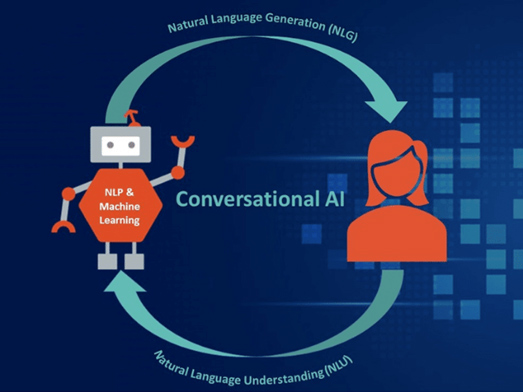
The insurance industry plays a crucial role in modern economies by providing financial protection against unforeseen risks. It encompasses various sectors, including travel, health, automotive, property, and life insurance, impacting individuals, businesses, and governments. Claims processing is a fundamental aspect of travel insurance operations. It serves as a bridge between policy issuance and fulfillment.
In recent years, the travel insurance sector has witnessed the emergence and evolution of conversational AI in insurance technology, which has significantly transformed traditional claims processing methods. This innovative approach enables insurers to automate various aspects of claims handling, streamline communication channels, and enhance the overall customer experience.
Let’s discover more about conversation AI and insurance interaction and how they empower the travel insurance industry.

Source: webio.com/blog/conversational-ai-solution
Conversational AI refers to using artificial intelligence (AI) technologies to enable natural and human-like conversations between computers and humans. It comprises various components such as chatbots, virtual assistants, and voice recognition systems to help with tasks like claims processing. McKinsey estimates that by 2023, half of the claims will be handled by automation. These stats show the importance of conversation AI in insurance claims handling.
Natural Language Processing (NLP) and machine learning support conversational AI systems. NLP enhances interactions within conversational AI systems. Its algorithms enable computers to understand, interpret, and generate human language, allowing them to comprehend user queries, extract relevant information, and respond appropriately. NLP enhances the accuracy and contextuality of conversational interactions, thereby improving user satisfaction and engagement.
Machine learning is vital in improving conversational AI’s capabilities by enabling systems to learn from data and adapt to evolving user preferences and language patterns. Through machine learning algorithms, conversational AI insurance systems can analyze large volumes of conversational data, and identify patterns and trends. This iterative learning process enables conversational AI systems to become more accurate, efficient, and contextually aware.

Source: Streamlining Claims Processing with Intelligent Process Automation (claimsjournal.com)
Traditional challenges in the claims processing workflow include manual data entry, paperwork redundancies, and fragmented communication channels. These legacy processes often result in errors, delays, and inefficiencies, leading to increased operational costs and decreased productivity.
Conventional claims processing methods plague delays, inefficiencies, and customer dissatisfaction. Lengthy processing times, complex documentation requirements, and bureaucratic hurdles contribute to policyholder frustration and dissatisfaction with insurance providers. Moreover, the lack of transparency and communication throughout the claims journey exacerbates customer frustration, as claimants often feel left in the dark regarding the status of their claims.
There is a pressing need for Innovation to address the shortcomings inherent in traditional claims processing methods. Insurers can streamline claims workflows, improve data accuracy, and enhance the overall customer experience using technological advancements, such as artificial intelligence, machine learning, and automation. Innovative solutions, such as conversational AI insurance technology, offer opportunities to automate routine tasks, facilitate real-time communication, and provide personalized support to claimants.

Source: What is conversational AI, and how does it work? (sinch.com)
The transformative impact of Conversational AI on claims processing is profound, revolutionizing traditional methods and enhancing efficiency, accuracy, and customer satisfaction. Gartner reports that conversation AI will save $80 billion in labor costs for contact center agents till 2026.
Conversational AI in claims processing facilitates personalized interactions between insurers and policyholders. Through AI-driven chatbots and virtual assistants, insurers can tailor responses to individual needs, preferences, and circumstances, providing a more engaging and empathetic experience. It provides policyholders round-the-clock accessibility and responsiveness, regardless of time or location.
Claimants can initiate and track their claims at their convenience without waiting for business hours or speaking with a live agent. Traditional claims processing methods often involve lengthy wait times, complex paperwork, and fragmented communication channels. Conversational AI insurance alleviates these pain points by streamlining the claims journey, automating routine tasks, and providing clear and consistent guidance.
Conversational AI in insurance enables insurers to provide policyholders with real-time updates and status checks on their claims. Through AI-driven chatbots and messaging platforms, claimants can inquire about the progress of their claims, receive notifications on critical milestones, and track the status of payments or approvals. This instant access to information enhances transparency and reduces uncertainty, empowering policyholders to stay informed and engaged throughout the claims process.
Conversational AI facilitates instant clarification of policy-related queries for policyholders. AI-powered chatbots can address various inquiries regarding policy coverage, deductibles, claim procedures, and eligibility criteria. Insurance Conversational AI reduces the burden of extensive paperwork and documentation for policyholders by digitizing and automating various aspects of the claims process.
Conversational AI solutions for insurance enhance the efficiency of handling and assessing claims by automating the triage and initial assessment processes. AI-driven chatbots can engage with claimants in real-time, collect relevant information about the incident, and determine the severity and urgency of the claim.
It enables insurers to utilize advanced data analytics techniques for accurate claim evaluations. AI-powered systems can more effectively identify patterns, detect anomalies, and assess claim validity by analyzing large volumes of structured and unstructured data, including text, images, and sensor data. Machine learning algorithms can learn from historical claims data, identify fraudulent behaviors, and flag suspicious claims for further investigation.
This data-driven approach enhances the accuracy and objectivity of claim evaluations, minimizes manual intervention, and reduces the risk of errors or bias, leading to more informed and consistent decision-making. Conversational AI insurance facilitates faster claim settlements through automated processes and workflows.
Lemonade recently achieved a groundbreaking feat in insurance claim settlement. Using their proprietary claims resolution system, Lemonade settled a genuine insurance claim within an unprecedented two seconds, facilitated by their AI chatbot named Jim. Lemonade handles nearly half of its claims through AI-driven processes, marking a significant shift towards efficient and streamlined claim management.
The rapid claim settlement achieved by Lemonade demonstrates the tangible impact of conversational AI technology on claims processing efficiency. This achievement sets a new standard for claims processing and signifies a paradigm shift in the insurance industry towards embracing advanced technologies to enhance operational efficiency and customer satisfaction.
Zurich Insurance faced challenges with limited customer reporting hours and high operational costs due to traditional claim processing methods. Seeking a solution, they collaborated with Spixii to develop a 24/7 claims chatbot named Zara to streamline claim reporting for digital-native customers.
The implementation of Zara yielded significant results for Zurich Insurance, with Zara managing 35% of claim requests, resulting in a 30% time saving and an impressive 80% Net Promoter Score (NPS). Customer feedback was positive, emphasizing Zara’s effectiveness in providing round-the-clock support. This success showcases the scalability and impact of conversational AI technology in transforming claims processing and enhancing customer experience within the insurance sector.
Allstate has embraced conversational AI technology with its virtual assistant, ABIe. It employs Machine Learning, Natural Language Processing (NLP), and Speech Recognition to understand customer queries and offer appropriate responses. ABIe’s capabilities extend to various tasks like handling policy changes, billing inquiries, and claims processing, showcasing its versatility in assisting customers.
Moreover, ABIe seamlessly integrates with human agents, demonstrating the potential for AI to collaborate with human representatives. In cases where queries are too intricate for ABIe to handle independently, it can smoothly escalate them to human agents, highlighting the synergy between AI and human-driven customer service. This collaboration illustrates how conversational AI technology like ABIe can revolutionize claims processing in the insurance sector, enhancing efficiency and customer experience.
Liberty Mutual employs AI-powered chatbots like Emma to streamline customer interactions, including claims processing and policy management in travel insurance. Emma utilizes Natural Language Processing (NLP) and Machine Learning to understand customer inquiries and furnish appropriate responses efficiently. This technology enhances customer service by addressing queries promptly and aids in overall claims processing, contributing to a smoother insurance experience for travelers.
Moreover, Liberty Mutual’s Conversational AI platform extends beyond basic inquiry handling; it actively monitors customer sentiment and feedback. By gauging customer reactions, the company can iteratively refine its services, ensuring improvements in its travel insurance offerings. This emphasis on using AI to enhance operational efficiency underscores Liberty Mutual’s commitment to providing tailored, customer-centric solutions in the insurance landscape.
Insurers should develop a comprehensive roadmap for implementing conversational AI, outlining clear objectives, timelines, and success metrics. This roadmap should align with the organization’s broader digital transformation goals and prioritize use cases that deliver the most significant business value. Insurers can effectively identify opportunities utilizing conversational AI and chart a phased deployment and adoption roadmap.
Insurers should collaborate with experienced technology partners and experts in conversational AI to ensure successful implementation and ongoing support. Engaging with reputable vendors, consultants, and solution providers can provide access to specialized expertise, best practices, and proven methodologies for developing and deploying AI-driven solutions. Insurers can accelerate the adoption timeline, mitigate implementation risks, and tap into the latest conversational AI insurance technology advancements to stay competitive.
Insurers should strive to strike the right balance between automation and the human touch in customer interactions when deploying conversational AI in insurance. While AI-driven chatbots and virtual assistants offer scalability, efficiency, and 24/7 availability, they should complement rather than replace human agents, especially in complex or sensitive situations. Insurers should design conversational AI solutions with built-in escalation paths to human agents when needed, ensuring seamless handoffs and continuity in customer support.
Conversational AI and insurance bond have revolutionized claims processing by streamlining interactions between insurers and policyholders, enhancing efficiency in handling and assessing claims, and improving the overall customer experience. Conversational AI has transformed traditional methods through personalized interactions, real-time updates, and automated processes, reducing delays, inefficiencies, and frustrations associated with conventional claims processing workflows.
The widespread adoption of Conversational AI holds immense potential for the insurance industry’s future. As insurers continue to embrace AI-driven technologies, they will unlock new opportunities for Innovation, differentiation, and value creation. With conversational AI enabling seamless communication, data-driven insights, and predictive analytics, insurers can proactively anticipate and address customer needs.
In light of conversational AI’s transformative impact on insurance, insurers must embrace Innovation and adapt to the evolving landscape of claims processing. Embracing Innovation will drive operational excellence, strengthen customer relationships, and position insurers for long-term success in an increasingly digital and competitive marketplace.